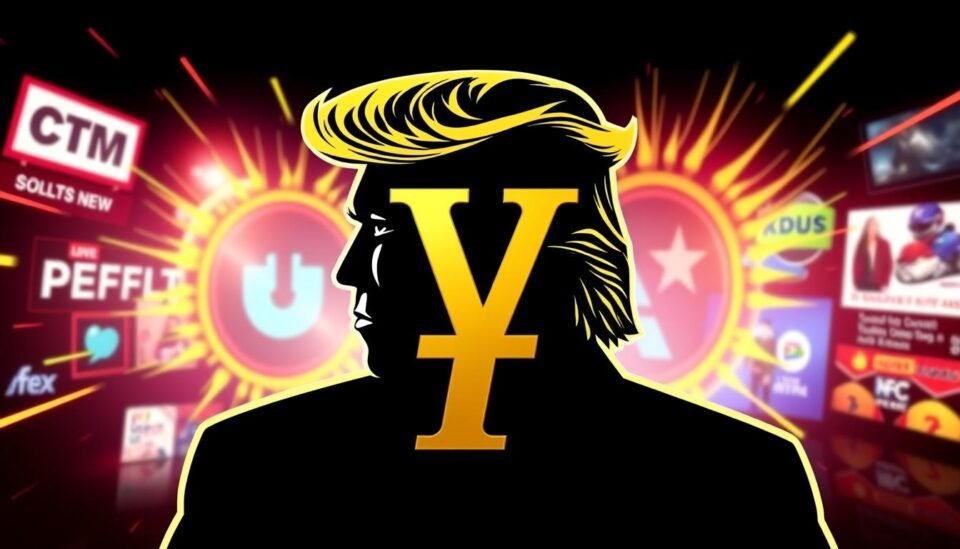Donald Trump’s name and likability are key parts of his brand. This guide explores if he can legally protect these assets through trademarking.
We’ll look at the complex world of trademark law. We’ll see what Trump might face in protecting his identity.
We’ll cover the basics of trademark registration. We’ll also explore how to trademark a personal name.
Can “likability” be trademarked? We’ll discuss what this means for public figures.
We’ll walk through the trademark application process. We’ll address enforcement, maintenance, and celebrity influence in trademark law.
By the end, you’ll understand Trump’s options for trademarking. You’ll also know the challenges he might face.
Understanding Trademark Basics
Trademark law protects unique signs, symbols, or words that identify products or services. It’s crucial for safeguarding personal brands and preventing unauthorized use of names or images.
Trademark law aims to protect consumers from confusion and ensure fair competition. Registering a trademark gives exclusive rights to a brand.
Trademark protection is valuable for high-profile individuals like Donald Trump. It allows public figures to control their brand and prevent misrepresentation.
This is important in the age of social media. Information spreads quickly and can impact a person’s public image.
Understanding trademark law basics is crucial for protecting personal brands. This includes knowing the registration process and protection criteria.
Public figures can use this legal tool to safeguard their brand. It helps them maintain control over their public image.
Trademarking Personal Names
Trademarking personal names is a complex legal process. Many celebrities have protected their name through trademark registration.
Beyoncé has trademarked her name and several variations. This safeguards her brand and prevents unauthorized use.
Legal requirements for trademarking a personal name can vary. Factors include name uniqueness, prior use, and potential for confusion.
Trump’s trademark attempt may face challenges due to his status. His brand’s widespread recognition could complicate the process.
Expert legal guidance is crucial for personal name trademarks. Celebrities must meet specific criteria to succeed.
They need to show their name has secondary meaning. It should be distinctly associated with their brand.
Trump must consider legal requirements and potential pitfalls. His success depends on proving his brand’s uniqueness.
He’ll need to invest resources to protect his intellectual property. Ongoing efforts are necessary to maintain trademark rights.
Trump’s Legal Standing
The Trump brand keeps growing. This makes Donald Trump’s legal position on his name important.
Trump’s empire covers many industries. His trademark portfolio adds value to the Trump brand.
Trump has faced legal challenges. He’s been in many trademark battles over the years.
These cases have tested personal name trademarks. They set rules for Trump and others.
Trump has kept a strong legal position. He’s won many cases defending his brand.
His victories could help future trademark applications. This could make the Trump brand stronger.
The Trump brand keeps changing. Understanding the legal landscape is key.
Personal name trademarks and likability remain important. They’ll shape future talks about the Trump brand.
Likability: A Trademarkable Concept?
Likability has become a hot topic in trademarks. It’s an intangible asset that can boost a brand’s success.
The Trump brand raises a question. Can likability be trademarked?
Trademarks usually protect logos, slogans, and product names. But brand perception and personality traits are gaining importance.
Protecting intangible assets like likability is tricky. These traits can be hard to define objectively.

Some personality traits have been trademarked before. “Have a Coke and a Smile” is one example.
“The Happiest Place on Earth” is another. These show courts value emotional connections.
The Trump brand keeps evolving. Trademarking the former president’s likability could be groundbreaking.
This idea might gain legal recognition. Brand perception is becoming more important in business.
The Trademark Application Process
Registering a trademark with the USPTO can be tricky. A thorough search is crucial to ensure your desired trademark is unique.
The next step is filling out the USPTO’s application form. You’ll need to provide details about your mark and its use.
The process includes review, possible publication, and final decision. This can take months to complete.
Be ready to address any concerns during the review. Stay on top of deadlines and communicate clearly with the USPTO.
For public figures like Donald Trump, trademarks are vital. They protect personal brands and control public image.
Understanding USPTO rules helps safeguard intellectual property effectively. This knowledge is key to successful trademark registration.
Enforcement and Maintenance
Protecting the Trump trademark is a complex process. It requires constant vigilance to prevent unauthorized use.
Trump’s team must develop strong brand protection strategies. This includes regular trademark searches and legal action when needed.
Trademark ownership demands ongoing maintenance. Trump must renew his trademark and pay fees to the USPTO.
Failing to enforce a trademark can lead to loss of rights. A proactive approach helps protect Trump’s valuable personal brand.
This strategy prevents unauthorized use of the Trump name. It also helps maintain the brand’s strength in the market.
The Role of Celebrity Influence
Celebrity status impacts trademarking personal names and likeability. It offers advantages and challenges for protecting brand value.
Trump’s high-profile enhances his name’s perception. Yet, it also exposes him to greater scrutiny and legal hurdles.
Celebrity endorsements can boost a trademark’s brand value. Consumers often link famous people with quality and prestige.
Trump’s widespread recognition could help trademark his name. His larger-than-life persona may work in his favor.
However, celebrity status can make enforcing trademark rights harder. Public figures face more scrutiny and criticism.
Trump must balance trademark law with maintaining a positive image. This highlights challenges for high-profile individuals protecting their brand.
Future Implications for Trump’s Brand
The Supreme Court’s decision on Trump’s “Trump too small” trademark bid shapes his brand’s future. This ruling shows the complex link between Trump’s political influence and his business plan.
Trump’s brand, tied to his name, now faces new challenges. He must balance his political goals with his business empire.
The decision could affect his various businesses. Trump may need to change his brand evolution and business strategy.
The ruling also impacts Trump’s political impact and public image. The court’s unanimous yet divisive decision highlights the Trump brand’s polarizing nature.
Trump must carefully manage his public image. This will help secure his legacy in both politics and business.
